1061 scholarly books by Catholic University of America Press and 73
have author last names that start with D
1061 scholarly books by Catholic University of America Press and 73
1061 scholarly books by Catholic University of America Press
73 have author last names that start with D have author last names that start with D
73 have author last names that start with D have author last names that start with D
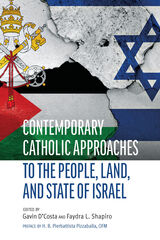
Contemporary Catholic Approaches to the People, State, and Land of Israel
Gavin D'Costa
Catholic University of America Press, 2021
After Vatican II, the Roman Catholic Church began a process of stripping away anti-Jewish sentiments within its theological culture. One question that has arisen and received very scant attention regards the theological significance of the founding of the state of Israel in 1948 – and the attendant nakba, the plight of the Palestinian people. Some American evangelical Christians have developed a theology around the state of Israel, associating themselves with Zionism. Some Christian groups have developed a theology around the suffering of the Palestinian people and demand resistance to Zionism.
This unique collection of essays from leading Catholic theologians from the United States, Germany, France, Italy, Switzerland, England, and the Middle East reflect on the theological status of the land of Israel. These essays represent an exhaustive range of views. None avoid the new Catholic theology regarding the Jewish people. Some contributors see this as leading towards a positive theological affirmation of the state of Israel, while distancing themselves from Christian Zionists. All contributors are committed to rights of the Palestinian people. Some affirm the need for strong diplomatic and political support for Israel along with equal support for Palestinians, arguing that this is as far as the Church can go. Others argue that the Church’s emerging theology represents the guilt conscience of Europe at the cost of the Palestinian people. None deny the right of Jews to live in the land.
Two Jewish scholars respond to the essays creating an atmosphere of genuine interfaith dialogue which serves Catholics to think further through these issues.
[more]
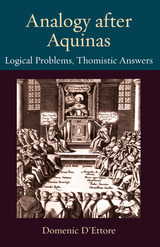
Analogy after Aquinas
Domenic D'Ettore
Catholic University of America Press, 2018
Since the first decade of the 14th Century, Thomas Aquinas’s disciples have struggled to explain and defend his doctrine of analogy. Analogy after Aquinas: Logical Problems, Thomistic Answers relates a history of prominent Medieval and Renaissance Thomists’ efforts to solve three distinct but interrelated problems arising from their reading both of Aquinas’s own texts on analogy, and from John Duns Scotus’s arguments against analogy and in favor of univocity in Metaphysics and Natural Theology. The first of these three problems concerns Aquinas’s at least apparently disparate statements on whether a name is said by analogy through a single concept or through diverse concepts. The second problem concerns the model of analogy suited for predicating names analogously across the categories of being or about God and creatures. Is “being” said analogously about God and creatures, or substance and accidents, on the model of how “healthy” is said of medicine and an animal, or on the model of how “principle” is said of a point and a line? The third problem comes from outside challenges to Aquinas’s thought, in particular Scotus’ claims that univocal names alone can mediate valid demonstrations, and any demonstration that failed to use its mediating terms univocally would fail by the fallacy of equivocation. Analogy after Aquinas makes a unique contribution to the study of philosophical theology in the tradition of Thomas Aquinas by showing the historical and philosophical connection between these three problems, as well as the variety of solutions proposed by leading representatives of this tradition. Thomists considered in the book include: Hervaeus Natalis (1250-1323), Thomas Sutton (1250-1315), John Capreolus (1380-1444), Dominic of Flanders (1425-1479), Paul Soncinas (d. 1494), Thomas dio vio Cajetan (1469-1534), Francis Silvestri of Ferrara (1474-1528), and Chrysostom Javelli (1470-1538).
[more]
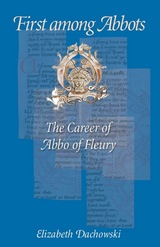
First among Abbots
The Career of Abbo of Fleury
Elizabeth Dachowski
Catholic University of America Press, 2008
Presents a coherent picture of this multifaceted man with an emphasis on his political alliances and the political considerations that colored his earliest biographical treatment.
[more]
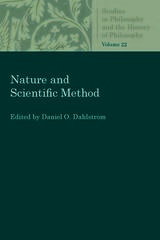
Nature and Scientific Method
Daniel O. Dahlstrom
Catholic University of America Press, 2018
The present volume is a collection of systematic and historical studies addressing the terms of Aristotelian inference.
[more]
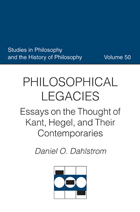
Philosophical Legacies
Essays on the Thought of Kant, Hegel, and Their Contemporaries (Studies in Philosophy and the History of Philosophy, Volume 50)
Daniel O. Dahlstrom
Catholic University of America Press, 2008
The essays trace carefully the histories of the influences of earlier thinkers and their legacies upon later thinkers.
[more]
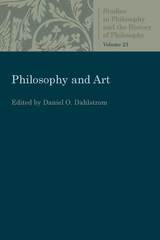
Philosophy and Art
Daniel O. Dahlstrom
Catholic University of America Press, 2018
The 13 essays in this collection are marked by a diversity of philosophical styles and perspectives on art. While some authors focus on specific forms of art, others are more concerned with the interpretation given to art by past and contemporary philosop
[more]
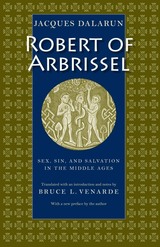
Robert of Arbrissel
Sex, Sin, and Salvation in the Middle Ages
Jacques Dalarun
Catholic University of America Press, 2006
This book tells the fascinating story of Robert of Arbrissel (ca. 1045-1116). Robert was a parish priest, longtime student, reformer, hermit, wandering preacher, and, most famously, founder of the abbey of Fontevraud
[more]
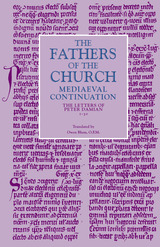
Letters, 1-30
Peter Damian
Catholic University of America Press, 1989
Peter Damian (1007-1072), an eleventh-century monk and man of letters, left a large and significant body of correspondence. Over one hundred and eighty letters have been preserved, principally from Damian's own monastery of Fonte Avellana. Ranging in length from short memoranda to longer monographs, the letters provide a contemporary account of many of the controversies of the eleventh century: purgatory, the Eucharist, clerical marriage and celibacy, immorality, and others. Peter Damian, or "Peter the Sinner" as he often referred to himself, was one of the most learned men of his day, and his letters are filled with both erudition and zeal for reform.
[more]
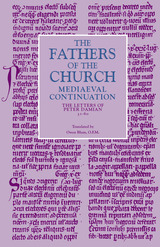
Letters, 31-60
Peter Damian
Catholic University of America Press, 1990
Peter Damian (1007-1072), an eleventh-century monk and man of letters, left a large and significant body of correspondence. Over one hundred and eighty letters have been preserved, principally from Damian's own monastery of Fonte Avellana. Ranging in length from short memoranda to longer monographs, the letters provide a contemporary account of many of the controversies of the eleventh century: purgatory, the Eucharist, clerical marriage and celibacy, immorality, and others. Peter Damian, or "Peter the Sinner" as he often referred to himself, was one of the most learned men of his day, and his letters are filled with both erudition and zeal for reform.
[more]
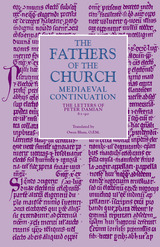
Letters, 61-90
Peter Damian
Catholic University of America Press, 1992
Peter Damian (1007-1072), an eleventh-century monk and man of letters, left a large and significant body of correspondence. Over one hundred and eighty letters have been preserved, principally from Damian's own monastery of Fonte Avellana. Ranging in length from short memoranda to longer monographs, the letters provide a contemporary account of many of the controversies of the eleventh century: purgatory, the Eucharist, clerical marriage and celibacy, immorality, and others. Peter Damian, or "Peter the Sinner" as he often referred to himself, was one of the most learned men of his day, and his letters are filled with both erudition and zeal for reform.
[more]
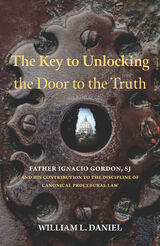
The Key to Unlocking the Door to the Truth
Father Ignacio Gordon, SJ, and His Contribution to the Discipline of Canonical Procedural Law
William L. Daniel
Catholic University of America Press, 2022
Father Ignacio Gordon, SJ, taught canon law (the Catholic Church’s law) from 1960 until 1985 at the Pontifical Gregorian University in Rome, with a concentration on procedural law, or the laws on trials. By all testimonies, he was outstanding for the clarity of his teaching, his humble affection for his students, his indefatigable and hidden service to the Apostolic See, and his priestly zeal. Notable among his endeavors was an educational initiative for the ongoing formation of judges and other ministers of justice in ecclesiastical tribunals. In his teaching, he stressed the ecclesial importance and supernatural implications of procedural law in general, and the indispensability of the judicial protection of marriage in particular. Special efforts were made to make procedural law understandable to his students and to canonists in general, at a time when the Church was celebrating and implementing the teachings of the Second Vatican Ecumenical Council, as a result of which her law was undergoing a major revision. Father Gordon taught from the consistent canonical tradition, while also laying bare the latest developments in law and jurisprudence. He taught the entirety of the law on trials, producing numerous scholarly works on questions both timeless and new, giving marked emphasis to the problem of the excessive length of trials and the causes of delayed justice. An area of his particular attention and dedication was the Supreme Tribunal of the Apostolic Signatura—of which he was a consultor (referendary and later votans)—including both its proper law and its history. This history displayed, in part, why that Tribunal was the natural one to function as the supreme administrative tribunal of the Church. Father Gordon’s contribution to the question of ecclesiastical administrative justice was among those leading the novel and dynamic discussion about it in the 1960s and 1970s.
[more]
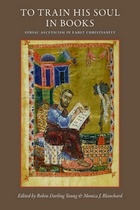
To Train His Soul in Books
Syriac Asceticism in Early Christianity
Robin Darling Young
Catholic University of America Press, 2011
To Train His Soul in Books explores numerous aspects of this rich religious culture, extending previous lines of scholarly investigation and demonstrating the activity of Syriac-speaking scribes and translators busy assembling books for the training of biblical interpreters, ascetics, and learned clergy.
[more]
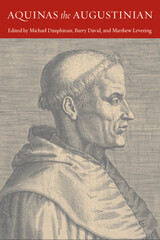
Aquinas the Augustinian
Michael Dauphinais
Catholic University of America Press, 2007
The book is composed of eleven essays by an international group of renowned scholars from the United States, England, Switzerland, Holland, and Italy
[more]
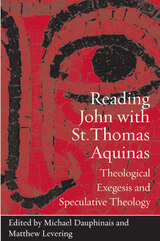
Reading John with St. Thomas Aquinas
Theological Exegesis and Speculative Theology
Michael Dauphinais
Catholic University of America Press, 2005
This volume fits within the contemporary reappropriation of St. Thomas Aquinas, which emphasizes his use of Scripture and the teachings of the church fathers without neglecting his philosophical insight.
[more]
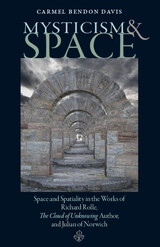
Mysticism and Space
Space and Spatiality in the Works of Richard Rolle, The Cloud of Unknowing Author, and Julian of Norwich
Carmel Bendon Davis
Catholic University of America Press, 2008
Mysticism and Space examines the influence and representation of space in the texts of three medieval mystics, Richard Rolle, Julian of Norwich, and The Cloud of Unknowing author
[more]
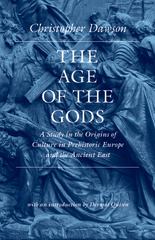
The Age of the Gods
Christopher Dawson
Catholic University of America Press, 2012
When first published in 1928, The Age of the Gods was hailed as the best short account of what is known of pre-historic man and culture. In it, Christopher Dawson synthesized modern scholarship on human cultures in Europe and the East from the Stone Age to the beginnings of the Iron Age.
[more]
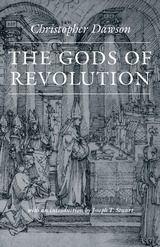
The Gods of Revolution
Christopher Dawson
Catholic University of America Press, 2015
Please fill in marketing copy
[more]
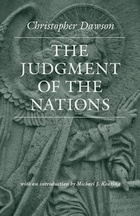
The Judgment of the Nations
Christopher Dawson
Catholic University of America Press, 2011
Christopher Dawson wrote The Judgment of the Nations in 1942, in the midst of the horrors of World War II.
[more]
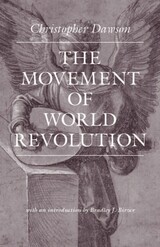
The Movement of World Revolution
Christopher Dawson
Catholic University of America Press, 2013
The Movement of World Revolution, originally published in 1959, explores many of the themes Dawson considered most important in his lifetime: the religious foundation of human culture, the central importance of education for the recovery of Christian humanism, the myth of progress, and the dangers of nationalism and secular ideologies.
[more]
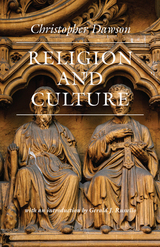
Religion and Culture
Christopher Dawson
Catholic University of America Press, 2013
Religion and Culture was first presented by historian Christopher Dawson as part of the prestigious Gifford Lecture series in 1947. It sets out the thesis for which he became famous: religion is the key of history
[more]
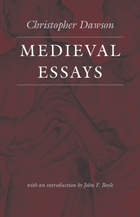
Medieval Essays (The Works of Christopher Dawson)
Christopher Dawson
Catholic University of America Press, 2002
Medieval Essays is the mature reflection of one of the most gifted cultural historians of the twentieth century.
[more]
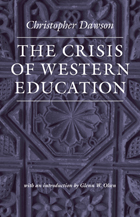
The Crisis of Western Education (The Works of Christopher Dawson)
Christopher Dawson
Catholic University of America Press, 2010
The Crisis of Western Education, originally published in 1961, served as a capstone of Christopher Dawson's thought on the Western educational system.
[more]
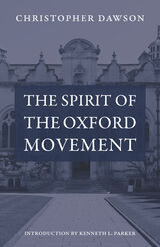
The Spirit of the Oxford Movement
Christopher Dawson
Catholic University of America Press, 2022
“This is the book we have been waiting for… a permanent enrichment of our understanding of the Oxford Movement” proclaimed The Downside Review upon the publication of Christopher Dawson’s masterwork in 1933, exactly 100 years after John Keble’s sermon "National Apostasy" stirred a nation. Dawson himself regarded the book as one of his two greatest intellectual accomplishments.
Dawson and John Henry Newman were Oxonians and both were converts to Catholicism; both stood against progressive and liberal movements within society. In both ideologies, Dawson saw a pathway that had once led to the French Revolution. Newman, for Dawson, was a kindred spirit.
In The Spirit of the Oxford Movement, Dawson goes beyond a mere retelling of the events of 1833 - 1845. He shows us the prime movers who sought a deeper understanding of the Anglican tradition: the quixotic Hurrell Froude, for instance, who "had none of the English genius for compromise or the Anglican faculty of shutting the eyes to unpleasant facts." It was Froude who brought Newman and Keble together and who helped them understand each other. In many ways, Dawson sees these three as the true embodiment of the Tractarian ethos.
Dawson probes deeply, though, to provide a richer, clearer understanding of the intellectual underpinnings of the Oxford Movement, revealing its spiritual raison d’être. We meet a group of gifted like-minded thinkers, albeit with sharp disagreements, who mock outsiders and each other, who pepper their letters with Latin, and forever urge each other on. Newman came to believe, as did Dawson, that the only intellectually coherent bastion against secular culture was religion, and the “on” to which they were urged was the Catholic church. The Spirit of the Oxford Movement provides insights into why Newman, and Dawson, came to this understanding.
[more]
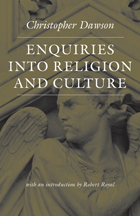
Enquiries into Religion and Culture (The Works of Christopher Dawson)
Christopher Dawson
Catholic University of America Press, 2009
The essays presented in this volume are among the most wide-ranging, intellectually rich, and diverse of Christopher Dawson's reflections on the relations of faith and culture
[more]
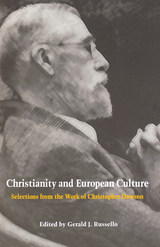
Christianity and European Culture (Selections from the Work of Christopher Dawson)
Christopher Dawson
Catholic University of America Press, 1998
This book provides a comprehensive introduction to the development of Dawson's thinking on questions that remain of contemporary importance
[more]
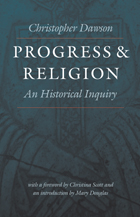
Progress and Religion
An Historical Inquiry (The Works of Christopher Dawson)
Christopher Dawson
Catholic University of America Press, 2001
Progress and Religion was perhaps the most influential of all Christopher Dawson's books, establishing him as an interpreter of history and a historian of ideas.
[more]
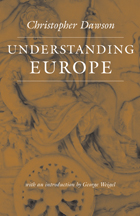
Understanding Europe (The Works of Christopher Dawson)
Christopher Dawson
Catholic University of America Press, 2009
In Understanding Europe, Dawson expresses a desire for Europe to rediscover and renew its foundational Christian sources in order to recover a deeper sense of integrity.
[more]
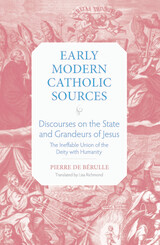
Discourse on the State and Grandeurs of Jesus
The Ineffable Union of the Diety with Humanity
Pierre de Bérulle
Catholic University of America Press, 2023
Pierre de Bérulle (1575–1629) is one of the foremost personalities of early modern Catholicism. As the founder of the “French school” of spirituality, he has exercised a profound influence on the Church from the seventeenth century to the present day. Until now, however, very little of Bérulle’s writings have been available in English. This volume provides the first complete English translation of his best-known work, first printed in Paris in 1623 and titled Discourses on the State and Grandeurs of Jesus, by the Ineffable Union of the Deity with Humanity, and the Submission and Servitude that Is Due Him and His Most Holy Mother in Response to This Wondrous State. Composed in his maturity, this work expresses Bérulle’s theology of the Man-God, whose self-emptying has enabled us to become “capable” of God.
In contrast to other spiritual writers who taught that mystical union with God follows the extinction of all sensory and conceptual awareness and all activity of willing, Bérulle’s focus is on the faithful soul’s participation in what he calls Jesus’ “states,” or inner dispositions. The state that Bérulle describes and honors supremely in this text is Jesus’ state of self-emptying in the mystery of the Incarnation. In the hypostatic union, our humanity in Christ is lifted up to heaven, and Christ is the first fruit of humanity-made-divine, the “firstborn among many brothers.” Through him we become children of God by adoption, participants in God’s divine being.
This is an outstanding translation, conveying not only the meaning but also the beauty and rhetorical features of the original. The Discourses will repay reading as a poignant source of personal devotion, a primary text of the Catholic Reformation, and a classic of spiritual theology.
[more]
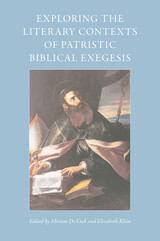
Patristic Exegesis in Context
Exploring the Genres of Early Christian Biblical Interpretation
Miriam De Cock
Catholic University of America Press, 2023
The essays of Patristic Exegesis in Context examine the biblical exegesis of early Christians beyond the formal genre of biblical commentary. The past couple of decades have seen a broadening of perspective on the study of patristic exegesis; the phenomenon is increasingly situated within its various literary contexts and genres, and the definition of what counts as patristic exegesis is therefore widened. This volume thus situates itself within this emerging scholarly tradition, which aims not to give an account of exegetical strategies and methodologies as found primarily in exegetical commentaries and homilies, but to demonstrate the highly sophisticated nature of biblical exegesis in other genres, and the manifold uses to which this exegesis was put. Ancient Christian authors lived and breathed scripture; it served as their primary source of theological and liturgical vocabulary, their way of processing the world, their social ethic, and their mode of constructing self and communal identity. Scripture therefore permeates all ancient Christian literature, regardless of genre, and the various contexts in which interpretation of scripture took place resulted in a wide variety of uses of the church’s authoritative texts. The essays in this volume demonstrate the interpretive skill, creativity, and sophistication of early Christian authors in a myriad of other early Christian genres, such as poetry, paraphrase, hymns, martyr accounts, homilies, prophetic vision accounts, monastic writings, argumentative treatises, encomia, apocalypses, and catenae. Accordingly, the volume aims to help the modern person, who is used to hearing the Bible explained in explicitly expository situations (for example, in academic commentaries or religious sermons) to become more habituated to ancient ways of interacting with and expounding the biblical text. These essays attempt to contextualize various types of patristic exegesis, in order for us to glimpse the complex and diverse uses of the Bible in this period.
[more]
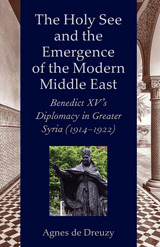
The Vatican and the Emergence of the Modern Middle East
Agnes de Dreuzy
Catholic University of America Press, 2016
The Holy See and the Emergence of the Modern Middle East examines the originality of Pope Benedict XVs diplomacy (1914-1922) during the First World War and the immediate post-war period in the modern Middle East emerging after the fall of the Ottoman Empire. A thorough exploration of the pontiff's statecraft regarding Syria, Lebanon, and Palestine serves as the case study and emphasizes Pope Benedict's participation in preparing the Catholic Church for an active role in the new world order.
[more]
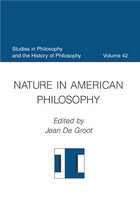
Nature in American Philosophy (Studies in Philosophy and the History of Philosophy, Volume 42)
Jean De Groot
Catholic University of America Press, 2004
With its focus on philosophy of nature, this book fills a gap in the ongoing reassessment of nineteenth-century American philosophy, and it opens the way to further study of the role played by reflection on nature in the emergence of the American mind.
[more]
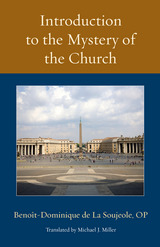
Introduction to the Mystery of the Church
Benoit-Dominique de La Soujeole, OP
Catholic University of America Press, 2014
An ecclesiological survey presenting a doctrinal synthesis of the church.
[more]
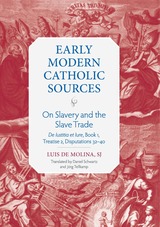
On Slavery and the Slave Trade
De Iustitia et lure, Book 1, Treatise 2, Disputations 32-40
Luis De Molina
Catholic University of America Press, 2023
In his monumental On Justice and Rights, the Jesuit Luis de Molina (1535-1600) discussed the legal and ethical aspects of the Portuguese trade in African and Asian enslaved persons. Molina surveys, develops, and problematizes the criteria necessary for the legitimate possession, sale, and purchase of human freedom. He insists that, even under legally valid slavery, persons who have sold or lost their freedom have inalienable rights as human beings, such as the freedom to make contracts, to marry, and even, under certain circumstances, to sue their owners in court. Molina also devotes attention to the ways in which slavery could be ended and whether and under what circumstances slaves had the right to escape from their owners. Well informed about the political structures and customs of many peoples in Africa, as well as Japan, China, and India, Molina paints a vivid and detailed picture of Portuguese trade. He gives specific accounts of the origins and development of the slave trade, region by region, and of the nature of the relationship between local rulers and the Portuguese kingdom. In doing so, he carefully describes the deception, coercion, and general indifference that pervades this trade regarding the rights to freedom of these people. It also attempts to identify the political, ecclesiastical, and market agents involved in this great injustice and their varying degrees of culpability. While Molina does not condemn slavery as a legal institution, the deeply flawed and even immoral behavior of sellers, buyers, regulators, and political rulers both in Portugal and in the slave-supplying regions that Molina denounces casts a heavy shadow on the morality of the trade.
[more]
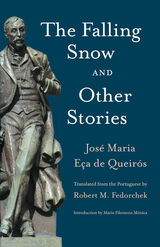
The Falling Snow and Other Stories
José Maria Eça de Queirós
Catholic University of America Press, 2022
The great nineteenth-century Portuguese author José Maria Eça de Queirós (1845-1900) has long been known for his novels, especially The Crime of Father Amaro (1880) and The Maias (1888). However, he also wrote short stories, and a number of them, having stood the test of time, are now regarded as masterpieces. Although there is no question that Eça owes the lion’s share of his reputation to his long fiction, the tales in this collection tell us that we are reading the work of a writer in full control of both genres.
The eleven selections range widely in theme and length and, except for “The Catastrophe”(which was published posthumously), are arranged in order of the year of publication. “The Falling Snow” and “Master Devil” contain elements of both the fantastic and realistic, a number of which call to mind Edgar Allan Poe, a writer whom Eça read and greatly admired. The power of love becomes the obsession of love in “The Peculiarities of a Blonde Girl” and “José Matias,” two of the stories that stand at the pinnacle of Eça’s reputation as a short story writer. “Civilization” will speak to nostalgia for a rustic life, while “Perfection” searches, through Ulysses and a special goddess, into a different kind of life, one without blemish. Other tales explore the nature of sacrifice (“The Wet Nurse”), greed and betrayal (“The Treasure”), jealousy and vengeance (“The Dead Man”), and faith in a young rabbi named Jesus (“The Gentle Miracle”). No one knows why Eça withheld publication of “The Catastrophe,” but this powerful story engages us with its naked intensity, its aroused passion, and its blunt honesty, for it amounts to a ringing endorsement of the exalted meaning of patriotism.
[more]
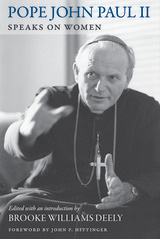
Pope John Paul II Speaks on Women
Brooke Williams Deely
Catholic University of America Press, 2014
In Pope John Paul II Speaks on Women, Brooke Williams Deely presents a comprehensive record of John Paul II's reflections. This collection brings to the forefront the full context and content of his original contributions. Since John Paul II encouraged women and men to expand what he has adumbrated, this book facilitates ongoing dialogue. The principle of the organization of the volume is chronological, compiling John Paul II's teachings on the subject of women arranged by date over the entire term of his Papacy. Since this influential Pope addressed the situation of women from the beginning of his pontificate, this overview of his writings and his spoken addresses best showcases the development and historical context of his thought.
[more]
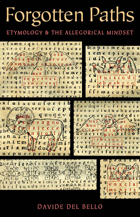
Forgotten Paths
Etymology and the Allegorical Mindset
Davide Del Bello
Catholic University of America Press, 2007
In Forgotten Paths, Davide Del Bello draws on the insights of Giambattista Vico and examines exemplary texts from classical, medieval, and Renaissance culture with the intent to trace the links between etymological and allegorical ways of knowing, writing, thinking, and arguing
[more]
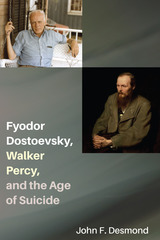
Fyodor Dostoevsky, Walker Percy, and the Age of Suicide
John F. Desmond
Catholic University of America Press, 2019
Fyodor Dostoevsky, Walker Percy, and the Age of Suicide is a study of the phenomenon of suicide in modern and post-modern society as represented in the major fictional works of Fyodor Dostoevsky and Walker Percy. In his study, suicide is understood in both a literal and spiritual sense as referring to both the actual suicides in their works and to the broader social malaise of spiritual suicide, or despair. In the 19th century Dostoevsky called suicide “the terrible question of our age”. For his part, Percy understood 20th century Western culture as “suicidal” in both its social, political and military behavior and in the deeper sense that its citizenry had suffered an ontological “loss of self” or “deformation” of being. Likewise, Thomas Merton called the 20th century an “age of suicide”.
[more]
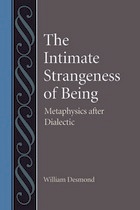
The Intimate Strangeness of Being
Metaphysics after Dialectic
William Desmond
Catholic University of America Press, 2012
This book explores the contested place of metaphysics since Kant and Hegel, arguing for a renewed metaphysical thinking about the intimate strangeness of being.
[more]
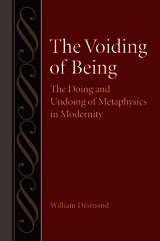
The Voiding of Being
The Doing and Undoing of Metaphysics in Modernity
William Desmond
Catholic University of America Press, 2020
In contemporary philosophy the status, indeed the very viability of metaphysics is a much contested issue. The reflections offered here explore diverse aspects of this contested status and offer a defense of metaphysics. In other works, perhaps most fully in Being and the Between, William Desmond has tried to develop what he calls a metaxological metaphysics in response to different skeptical, if not hostile approaches to metaphysics quite common in our time. The Voiding of Being complements the systematic dimensions of this metaxological metaphysics outlined in Being and the Between. It presents a set of studies which amplify important themes in the unfolding of modern metaphysics, in relation to major earlier and contemporary thinkers, while adding nuance to what is involved in the more systematic articulation of a metaxological metaphysics. There is what the author calls a voiding of being in modernity, expressed in diverse developments of thought. “The Voiding of Being,” might seems to conjure up too negative associations but the aim of the thoughts gathered here is not at all negative. While attempting to understand the voiding of being in modern thought, our appreciation of the promise of metaphysical thinking can also be renewed and indeed extended – extended beyond skepticism and hostility to metaphysics. Desmond engages many interlocutors along the way, from the long tradition, such as Heraclitus, Aquinas and Hegel, as well as more contemporary thinkers like Heidegger and Marion. As the book’s subtitle suggests, it is concerned with the continued doing of metaphysics and not only the contemporary undoing of it.
[more]
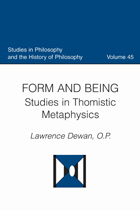
Form and Being
Studies in Thomistic Metaphysics (Studies in Philosophy and the History of Philosophy, Volume 45)
Lawrence Dewan, O.P.
Catholic University of America Press, 2006
Contains thirteen essays by Lawrence Dewan on metaphysics, the vision of reality from the viewpoint of being.
[more]
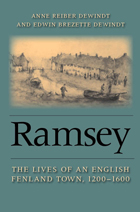
Ramsey
The Lives of an English Fenland Town, 1200–1600
Anne Reiber DeWindt
Catholic University of America Press, 2006
In a vividly detailed study of the small English market town of Ramsey, the authors examine the inner life of this fascinating community from the twelfth century to the end of the sixteenth century.
[more]
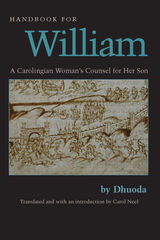
Handbook for William
A Carolingian Woman's Counsel for Her Son (Medieval Texts in Translation)
Dhuoda
Catholic University of America Press, 1999

Theology as an Ecclesial Discipline
Ressourcement and Dialogue
J. Augustine Di Noia
Catholic University of America Press, 2024
The practice of theology depends in part on asking the right questions. Not any sorts of questions, not idle questions, nor questions framed entirely by our own experience or the great issues of our times, but good theological questions focus the mind of the inquirer on the endlessly intelligible self-revelation of God to which the Sacred Scripture bears witness. Our own questions and the great questions of our times have a place, as long as they are purged of the ideological outlooks that can suppress or obscure the questions that the sacra pagina itself presses upon us.
Among the essays gathered in Theology as an Ecclesial Discipline, the first set directs the reader’s attention precisely to questions that trace the distinctive features of the nature of theology itself. What are the principles and scope of the field of theology as practiced by believers in an ecclesial context? Are historical-critical methods of exegesis compatible with a properly theological interpretation of the Scriptures? How can theology have a place in the academy as an intellectual discipline if the Magisterium seems to limit the scope of its inquiries? The second part considers a range of questions that preoccupy contemporary Protestant and Catholic theologians. Can the names Father, Son and Holy Spirit be replaced by more inclusive titles in doctrine and liturgy? By placing humanity at the center of theological investigation, is Christian humanism distinct from secular humanism? How can we be guilty of a sin committed by our first ancestors? Can the Christian vision of procreative human sexuality survive the cultural onslaught of the sexual revolution? The questions in the third part of this book arise from Catholic dialogue with non-Christian religions, or with other Christian communities, or with conceptions of a cosmos in ecological crisis. Is there a future for Catholic theology of religions? How can people who do not believe in Christ be saved? Is the cosmos a safe environment for human beings, or, alternatively, how can the cosmos be protected from human depredation? Can the concept of “church” stretch far enough to encompass Christian communities that see themselves as strictly local and independent bodies?
[more]
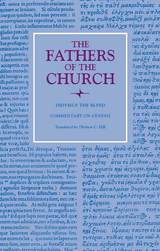
Commentary on Genesis
Didymus the Blind
Catholic University of America Press, 2016
Blind since early childhood, the Egyptian theologian and monk Didymus (ca. 313-398) wielded a masterful knowledge of Scripture, philosophy, and previous biblical interpretation, earning the esteem of his contemporaries Athanasius, Antony of Egypt, Jerome, Rufinus, and Palladius, as well as of the historians Socrates and Theodoret in the decades following his death. He was, however, anathematized by the Fifth Ecumenical Council in 553 because of his utilization and defense of the works of Origen, and this condemnation may be responsible for the loss of many of Didymus's writings. Jerome and Palladius mentioned that Didymus had written commentaries on Old Testament books; these commentaries were assumed to be no longer extant until the discovery in 1941 in Tura, Egypt, of papyri containing commentaries on Genesis, Zechariah, Job, Ecclesiastes, and some of the Psalms.
[more]
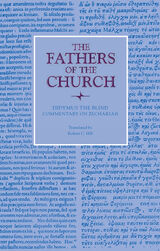
Commentary on Zechariah
Robert C. Didymus the Blind
Catholic University of America Press, 2006
A disciple of Origen, whose work on Zechariah reached only to chapter five and is no longer extant, Didymus's commentary on this apocalyptic book illustrates the typically allegorical approach to the biblical text that we associate with Alexandria
[more]

The Complete Short Stories, Volume 1
Enid Dinnis
Catholic University of America Press, 2023
Gathered here for the first time are the stories of Enid Dinnis, who lived and wrote in London throughout the first half of the 20th century. Enid Dinnis moved widely in the London literary world but she was also Mother Superior of a ‘hidden’ religious order, The Daughters of the Heart of Mary. Few in London’s literary scene knew that Dinnis was a nun but she lived most of her life in a small convent in Wimbledon with other well-known figures from the period, including Maud Petre. Dinnis wrote Catholic stories for readers of all ages. She is one of the finest lost authors of the Catholic Literary Revival. Dinnis’s intervention in the short story genre is considerable. She weaves together fairy tale, myth, Catholic mysticism, epiphanic dialogue and everyday characterization to produce stories that are both simple and complex, both light-hearted and profound. Always concerned with ‘the wonderful resourcefulness of the love of God’, her stories proclaim the presence and workings of divine grace in the everyday lives of all people—old and young, sceptics and seekers, farmers and priests. Dinnis’s stories show that God’s love is the answer to all human struggles and quests. They illustrate what it means to receive love – human and divine – and to pass it on. Her work is filled with visions and confessions, miracles and conversions – but it is never overly pious or saccharine. Her characters are real people experiencing the truths proclaimed by the Catholic faith, which is always as marvelous as it is every-day. Enid Dinnis’s stories reenchant the post-enlightenment world along Catholic lines. Her stories put the supernatural firmly back into the world in a way more needed than ever.
[more]
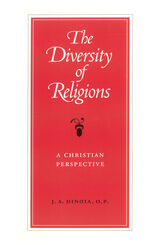
The Diversity of Religions
A Christian Perspective
J. A. DiNoia, O.P.
Catholic University of America Press, 1992
DiNoia approaches the debate in the theology of religions with a fresh, lucid, critical and informed mind. . . . This book is timely, provocative and explores new territories and recasts old debates in a fresh and intelligent manner. It will appeal to philosophers, theologians, indologists and those concerned with the meeting of Christianity and the world religions.--Gavin D'Costa, University of Bristol
[more]

The Fantasy of J.R.R. Tolkien
Mythopeia and the Recovery of Creation
Robert J. Dobie, Robert J.
Catholic University of America Press, 2024
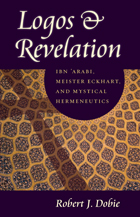
Logos and Revelation
Ibn 'Arabi, Meister Eckhart, and Mystical Hermeneutics
Robert J. Dobie
Catholic University of America Press, 2010
Logos and Revelation looks closely at the writings of two of the most prominent medieval mystical writers: the Muslim, Ibn 'Arabi (1165-1240) and the Christian Meister Eckhart (1260-1328).
[more]
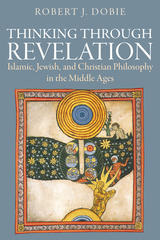
Thinking Through Revelation
Robert J. Dobie
Catholic University of America Press, 2019
Navigating the seemingly competing claims of human reason and divine revelation to truth is without a doubt one of the central problems of medieval philosophy. Medieval thinkers argued a whole gamut of positions on the proper relation of religious faith to human reason. Thinking Through Revelation attempts to ask deeper questions: what possibilities for philosophical thought did divine revelation open up for medieval thinkers? How did the contents of the sacred scriptures of Judaism, Christianity, and Islam put into question established philosophical assumptions? But most fundamentally, how did not merely the content of the sacred books but the very mode in which revelation itself is understood to come to us – as a book “sent down” from on high, as a covenant between God and his people, or as incarnate person - create or foreclose possibilities for the resolution of the philosophical problems that the Abrahamic revelations themselves raised?
[more]
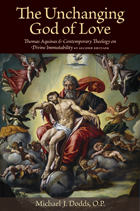
The Unchanging God of Love
Thomas Aquinas and Contemporary Theology on Divine Immutability (Second Edition)
Michael J. Dodds, O.P.
Catholic University of America Press, 2008
The Unchanging God of Love provides a clear and comprehensive account of what Aquinas really says about divine immutability, presented in a way that allows his theology to address contemporary criticisms
[more]
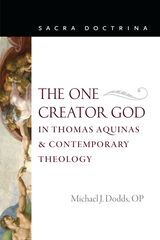
The One Creator God in Thomas Aquinas and Contemporary Theology
Michael J. Dodds, OP
Catholic University of America Press, 2020
This book provides a fundamental introduction to Aquinas's theology of the One Creator God. Aimed at making that thought accessible to contemporary audiences, it gives a basic explanation of his theology while showing its compatibility with contemporary science and its relevance to current theological issues. Opening with a brief account of Aquinas’s life, it then describes the purpose and nature of the Summa Theologica and gives a short review of current varieties of Thomism. Without neglecting other works, it then focuses primarily on the discussion of the One God in the first part of the Summa Theologica. God's transcendence and immanence is a recurrent theme in that discussion. Evidence of God's immanent causality in the natural world grounds Aquinas's five arguments for the existence of God (the Five Ways) which then open onto God's transcendence. The subsequent discussion of the divine attributes builds on the modes of God's causality established in the Five Ways. It also shows the need for a language of analogy to preserve God's transcendence and prevent us from reducing God to the level of creatures, even as qualities such as "goodness" and "love," which we first know from creatures, are applied to God. The discussion of God's providence and governance establishes that the transcendent Creator God is most intimately present in creation. God acts in all creatures in a way that does not diminish their proper causality, but is rather its source. As there is no contradiction between God's transcendence and immanence, so there is no competition between the primary causality of God and the secondary causality of creatures. Empirical science, which is limited by its method to the secondary causality of creatures, is shown to be compatible with the broader discipline of theology which also embraces the primary causality of the Creator.
[more]
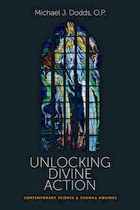
Unlocking Divine Action
Michael J. Dodds
Catholic University of America Press, 2012
Provides a sustained account of how the thought of Aquinas may be used in conjunction with contemporary science to deepen our understanding of divine action and address such issues as creation, providence, prayer, and miracles.
[more]
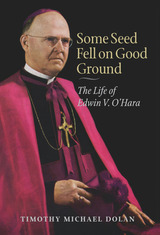
Some Seed Fell on Good Ground
The Life of Edwin V. O'Hara
Timothy Michael Dolan
Catholic University of America Press, 2012
A man far ahead of his time, Archbishop Edwin V. O'Hara of Kansas City (1881-1956) orchestrated numerous initiatives that profoundly affected American Catholic life.
[more]
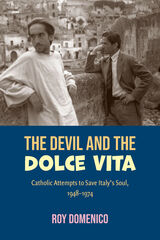
The Devil and the Dolce Vita
Catholic Attempts to Save Italy's Soul, 1948-1974
Roy Domenico
Catholic University of America Press, 2021
Italy’s economic expansion after World War Two triggered significant social and cultural change. Secularization accompanied this development and triggered alarm bells across the nation’s immense Catholic community. The Devil and the Dolce Vita is the story of that community – the church of Popes Pius XII, John XXIII and Paul VI, the lay Catholic Action association, and the Christian Democratic Party – and their efforts in a series of culture wars to preserve a traditional way of life and to engage and tame the challenges of a rapidly modernizing society.
Roy Domenico begins this study during the heady days of the April 1948 Christian Democratic electoral triumph and ends when pro-divorce forces dealt the Catholics a defeat in the referendum of May 1974 where their hopes crashed and probably ended. Between those two dates Catholics engaged secularists in a number of battles – many over film and television censorship, encountering such figures as Roberto Rossellini, Luchino Visconti, Federico Fellini, and Pier Paolo Pasolini. The Venice Film Festival became a locus in the fight as did places like Pozzonovo, near Padua, where the Catholics directed their energies against a Communist youth organization; and Prato in Tuscany where the bishop led a fight to preserve church weddings. Concern with proper decorum led to more skirmishes on beaches and at resorts over modest attire and beauty pageants. By the 1960s and 1970s other issues, such as feminism, a new frankness about sexual relations, and the youth rebellion emerged to contribute to a perfect storm that led to the divorce referendum and widespread despair in the Catholic camp.
[more]
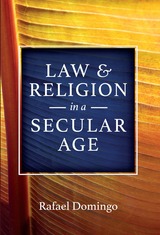
Law and Religion in a Secular Age
Rafael Domingo
Catholic University of America Press, 2023
Law and Religion in a Secular Age seeks to restore the connection between spirituality and justice, religion and law, theology and jurisprudence, and natural law and positive law by building a new bridge suitable for pluralistic societies in the secular age. The author argues for a multidimensional view of reality that includes legal, political, moral, and spiritual dimensions of human nature and society. Each of these dimensions of life needs to recognize the existence, influence, and function of the others, which act as a filter or check on the excesses of each other. This multidimensionality of reality clarifies why no legal theory can fully account for law from the legal dimension alone, just as no moral theory makes perfect sense of morality from the moral dimension—and, for that matter, nothing in physics can fully interpret the physical dimension of reality. The premises of a legal system cannot be fully explained by the legal dimension alone because the fundamental conditions and qualities of justice, freedom, and dignity touch all the dimensions of reality in which the human person acts, including the moral and the spiritual, not just the legal. Building on this multidimensional theory of reality, the author explores the core differences and the essential interconnections between law, morality, religion, and spirituality and some of the legal implications of these connections.
Rafael Domingo reminds readers of the vital role of religion in shaping the conceptual framework of Western legal systems, underscores the spirit of Christianity that inspired legal institutions, principles, and values, and recalls the contributions of specific Christian jurists as central figures for the development of justice in society.
Law and Religion in a Secular Age aims to be a valuable antidote against the dominant legal positivism that has cornered public morality, the defiant secularism that has marginalized religion, and any other legal doctrine that diminishes the spiritual dimension of law and justice.
[more]
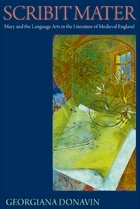
Scribit Mater
Marey and the Language Arts in the Literature of Medieval England
Georgiana Donavin
Catholic University of America Press, 2012
While Scribit Mater highlights different medieval English understandings of the Virgin's sapient eloquence according to class, education, and gender, it demonstrates long-standing and widespread traditions acknowledging and celebrating the Mother's verbal prowess.
[more]
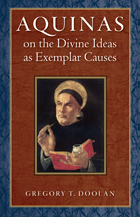
Aquinas on the Divine Ideas as Exemplar Causes
Gregory T. Doolan
Catholic University of America Press, 2008
Gregory T. Doolan provides here the first detailed consideration of the divine ideas as causal principles. He examines Thomas Aquinas's philosophical doctrine of the divine ideas and convincingly argues that it is an essential element of his metaphysics
[more]
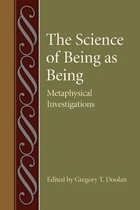
The Science of Being as Being
Metaphysical Investigations
Gregory T. Doolan
Catholic University of America Press, 2012
Scholars present studies on key philosophical and historical issues in the field. Though varied, the investigations address three major metaphysical themes: the subject matter of metaphysics, metaphysical aporiae, and philosophical theology.
[more]

Becoming What We Are
Classical and Christian Readings of Modernity
Jude P. Dougherty
Catholic University of America Press, 2023
Becoming What We Are is a collection of essays and reviews written in the last decade by the late Jude Dougherty, which covey a perspective on contemporary events and literature, written from a classical and Christian perspective. These essays convey a worldview much in need of restating when, according to Dougherty, Western society seems to have lost its bearings, in its legislative assemblies and in its judicial systems as well. Dougherty writes as a philosopher, specifically as one who has devoted most of his life to the study of metaphysics.
In these pages Dougherty examines the Jacobians, the empirical world of Hume, Locke and Hobbes, and Kant, the metaphysics of Plato, Aristotle, the Stoics and Aquinas that opens one to God and provides on with a moral compass, and critiques the work of Karl Marx, Sigmund Freud and John Dewey.
Becoming What We Are spends some time inquiring into the character of a few great men viz. George Washington, Charles De Gaulle and Moses Maimonides. Dougherty draws upon and shows respect for numerous contemporary authors who are engaged in research and analysis similar to his. The intent is, with the aid of others to restate some ancient but neglected truths. But more than that to show that true science is possible, that nature and human nature yield to human enquiry, that science is not to be confused with description and prediction.
[more]
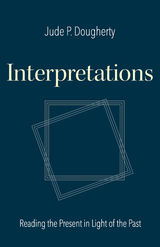
Interpretations
Reading the Present in Light of the Past
Jude P. Dougherty
Catholic University of America Press, 2018
Interpretations is a collection of essays produced by the distinguished philosopher Jude Dougherty over the past decade, written to inform or to provide commentary on contemporary issues. In probing the past to interpret the present they draw upon a perspective that one may call classical, the perspective of Plato, Aristotle, the Stoics, and their followers across the ages, notably Thomas Aquinas, and his modern disciples, such as Etienne Gilson and Jacques Maritain.
The first part of Interpretations is an attempt to understand modernity’s break with the past, the repudiation of Scholasticism and the classical tradition. Dougherty does this by referencing the dominant preoccupations of the Middle Ages, of the Renaissance, of the Reformation, of eighteenth-century British empiricism, and of nineteenth-century German philosophy, drawing upon the readings of Remi Brague, Pierre Manent, and others. What unifies these reflections is the role of religion (both in Christianity and Islam) in society and its impact on the culture, as well as looking at what is called “modernity” where this role becomes reduced or absent.
The second part of the volume examines selected addresses by Pope Emeritus Benedict XVI from a philosophical point of view. Benedict, like others through the course of history, has recognized the role of religion in producing cultural unity. These essays are an appreciation primarily of the subtlety of the former pontiff’s thought.
The third part of Interpretations collects essays and addresses on the practice and nature of philosophy that Dean Dougherty has given throughout his career at The Catholic University of America, and reflects the trajectory of his career and the development of his thought.
The first part of Interpretations is an attempt to understand modernity’s break with the past, the repudiation of Scholasticism and the classical tradition. Dougherty does this by referencing the dominant preoccupations of the Middle Ages, of the Renaissance, of the Reformation, of eighteenth-century British empiricism, and of nineteenth-century German philosophy, drawing upon the readings of Remi Brague, Pierre Manent, and others. What unifies these reflections is the role of religion (both in Christianity and Islam) in society and its impact on the culture, as well as looking at what is called “modernity” where this role becomes reduced or absent.
The second part of the volume examines selected addresses by Pope Emeritus Benedict XVI from a philosophical point of view. Benedict, like others through the course of history, has recognized the role of religion in producing cultural unity. These essays are an appreciation primarily of the subtlety of the former pontiff’s thought.
The third part of Interpretations collects essays and addresses on the practice and nature of philosophy that Dean Dougherty has given throughout his career at The Catholic University of America, and reflects the trajectory of his career and the development of his thought.
[more]
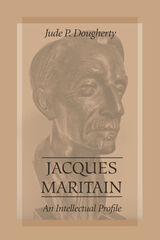
Jacques Maritain
An Intellectual Profile
Jude P. Dougherty
Catholic University of America Press, 2003
In Jacques Maritain: An Intellectual Profile, Jude P. Dougherty shares his lifetime interest in and study of Maritain with readers. He offers the most complete introduction to Maritain yet to be published, highlighting Maritain's many contributions to philosophy.
[more]
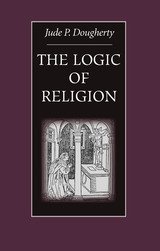
The Logic of Religion
Jude P. Dougherty
Catholic University of America Press, 2003
The Logic of Religion presents an examination of the nature of religion from a philosophical perspective. In successive chapters classical, medieval, and modern authors are canvassed for their views.
[more]
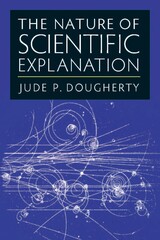
The Nature of Scientific Explanation
Jude P. Dougherty
Catholic University of America Press, 2013
In his newest work, distinguished philosopher Jude P. Dougherty challenges contemporary empiricisms and other accounts of science that reduce it to description and prediction.
[more]
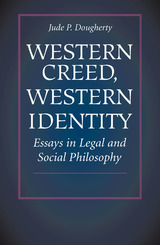
Western Creed, Western Identity
Essays in Legal and Social Philosophy
Jude P. Dougherty
Catholic University of America Press, 2000
In Western Creed, Western Identity, Jude P. Dougherty investigates the classical roots of Western culture and its religious sources in an effort to define its underlying intellectual and spiritual commitments.
[more]
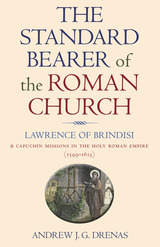
The Standard Bearer of the Roman Church
Lawrence of Brindisi and Capuchin Missions in the Holy Roman Empire (1599-1613)
Andrew J.G. Drenas
Catholic University of America Press, 2018
The Standard Bearer of the Roman Church examines the missionary work of the early modern Capuchin friar, and doctor of the Church, Lawrence of Brindisi. Renowned in his own day as a preacher, Bible scholar, missionary, chaplain, and diplomat, as well as vicar general of his order, Lawrence led the first organized, papally-commissioned Capuchin mission among the non-Catholics of Bohemia in the Holy Roman Empire from 1599 to 1602. He returned again under papal mandate, from 1606 to 1613. Andrew Drenas analyzes Lawrence’s evangelistic and polemical strategies in central Europe in order to shed light on some of the ways the Capuchins labored in religiously divided territories to confirm Catholics in their faith and to win over heretics. The introduction explains, principally, the book’s purpose and the historiographical background. After providing a brief biographical sketch of Lawrence’s life followed by details of his afterlife, Drenas examines Lawrence’s leading role in establishing the Capuchins’ new Commissariate of Bohemia-Austria-Styria in 1600, and specifically its first three friaries in Prague, Vienna, and Graz. From there the volume moves on to treat his preaching against heresy, followed by a focus on how Lawrence, while in Prague, involved himself directly in theological disputations with two different Lutheran preachers. The first dispute, with Polycarp Leyser, took place in July 1607, and dealt with good works and justification. The second, with a Lutheran whose identity remains unknown, and which occurred in August 1610, concerned Catholic veneration of the Virgin Mary. This is followed by an analysis of the Lutheranismi hypotyposis, or The Express Image of Lutheranism, Lawrence’s literary refutation of Lutheranism following additional contact with Polycarp Leyser in 1607. Finally, Drenas considers briefly the effectiveness of Lawrence’s apostolate and closes with a review of the book as a whole.
[more]
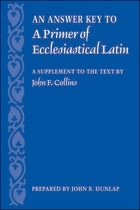
An Answer Key to 'A Primer of Ecclesiastical Latin'
John R. Dunlap
Catholic University of America Press, 2006
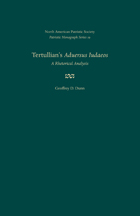
Tertullian's Aduersus Iudaeos
A Rhetorical Analysis (NAPS Patristic Monograph Series, Volume 19)
Geoffrey D. Dunn
Catholic University of America Press, 2008
Geoffrey D. Dunn is the first scholar to use classical rhetoric as the interpretative tool for analyzing the question of the authorship of Aduersus Iudaeos. He argues that Tertullian structured this work according to the rules of classical rhetoric and employed arguments familiar to anyone with training in oratory
[more]

Quaestiones super Secundum et Tertium De Anima Aristotelis (B. Ioannis Duns Scoti Opera Philosophica, Volume 5)
John Duns Scotus
Catholic University of America Press, 2006
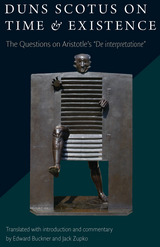
Duns Scotus on Time and Existence
John Duns Scotus
Catholic University of America Press, 2014
An English translation of John Duns Scotus's The Questions on Aristotle's "De Interpretatione" including an extensive commentary on some of Scotus's more difficult ideas.
[more]
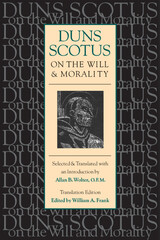
Duns Scotus on the Will and Morality
John Duns Scotus
Catholic University of America Press, 1997
No description available
[more]
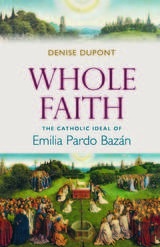
Whole Faith
The Catholic Ideal of Emilia Pardo Bazan
Denise DuPont
Catholic University of America Press, 2018
Emilia Pardo Bazán (1851-1921), the most important female author of Spain’s nineteenth century, was a prolific writer of novels, short stories, critical articles, chronicles of modern life, and plays. Active in the age of Catholic social teaching inaugura
[more]
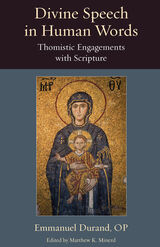
Divine Speech in Human Words
Thomistic Engagements with Scripture
Emmanuel Durand, OP
Catholic University of America Press, 2022
Is the portrait of God revealed in Scripture fundamentally intelligible? The biblical accounts of God reveal seemingly contradictory themes: God’s holiness and narratives telling of his anger; the Divine Omnipotence faced with the Impossible; the suffering Christ upon the Cross and the transcendent Trinity of Persons in God; the unique Savior and the universality of God’s salvific will; and so forth. How are we to hold together all of this data without denying any aspect of the mystery of God? Must we give into our ambient culture’s sense that the biblical God cannot be taken seriously by truly discerning and rational minds when they try to understand “the Divine”? Or, in the midst of this apparent contradiction, can we find the lines of harmony in the revealed mysteries?
In Divine Speech in Human Words, Fr. Emmanuel Durand unties some of the knots that face us when we reflect on the God of biblical Revelation. In each of the essays gathered here, Fr. Durand sympathetically articulates the tensions and apparent contradictions experienced by contemporary minds as they strive to understand the revealed truth of God. A whole host of topics are covered in this volume: the Cross and the revelation of the Trinity; God’s holiness and transcendence; divine immutability and the sorrow of a loving God; Divine Providence and human prayer; the fatherhood of God and eschatology; Christ’s way of life; and many others.
Drawing philosophical insights from the Thomistic tradition as his intellectual tools, Fr. Durand nonetheless emphasizes the importance of a properly theological mode of reflection, allowing these issues to be illuminated by the revealed truth of Sacred Scripture. Thus, for each of these difficult topics, he shows that a vital theological response must not limit itself to mere logical rigor but, rather, requires metaphysical insight and, above all, sapiential appreciation of God’s revealed word. With such instruments in hand, each essay approaches the tensions of biblical revelation with an eager readiness to show how a thoughtful Thomistic practice of biblical theology can guide faith as it seeks an understanding of both contemporary and perennial theological problems.
[more]
READERS
Browse our collection.
PUBLISHERS
See BiblioVault's publisher services.
STUDENT SERVICES
Files for college accessibility offices.
UChicago Accessibility Resources
home | accessibility | search | about | contact us
BiblioVault ® 2001 - 2024
The University of Chicago Press









